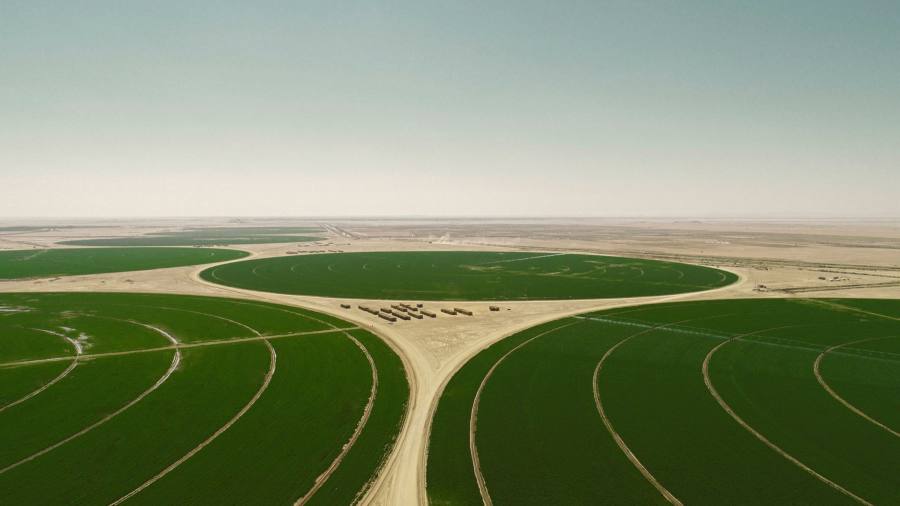[ad_1]
It has the feel of the fertile Argentine pampas: fresh green pastures, harvesting machines baling alfalfa, the smell of wet, cut grasses.
But this massive agricultural oasis lies in the Nubian Desert in northeastern Sudan on the right bank of the Nile, in circles of grassland sprayed 22 hours a day by centre pivot irrigation systems.
“This is the desert, you know, but we are turning it green,†says Osama Daoud Abdellatif, chairman of the DAL group, Sudan’s biggest conglomerate and one of the country’s top private agricultural investors. Step outside each grass field, and the desert stretches to Egypt.
“We have the Nile, then we have many other rivers, we have rain, we have underground water, and we have one of the flattest countries in the world,†he says. “Under the layers of sand there is good soil. So it’s not exactly difficult. You know, everything is there, you need to make it grow.â€

DAL’s $225m greenfield project in Abu Hamad — a joint venture with the Royal Group of Abu Dhabi and about 10km from the banks of the Nile — is watered by 18km of canals drawing water from the world’s longest river, which has nurtured desert agriculture for millennia. The goal is to cultivate 170,000 acres — split into 750 rounded plots — of pastures, wheat, grapefruits, and other crops. There are 50 plots in operation since the project started last year.
“The key is irrigation. If you can make irrigation work, you can make agriculture work,†says Nazim Khalil, DAL’s head of animal feed, grabbing a handful of fresh alfalfa. “This is a tough place, we often have sandstorms,†he says.
In Abu Hamad temperatures can rise to 48 Celsius during the summer, which makes irrigation challenging as the water evaporates faster during the day. As Sudan’s largest private company, DAL is one of the few with enough financial muscle and knowhow to make such a project work.
DAL has sales of more than $1bn a year, and a foothold in nearly every sector of Sudan’s economy, from food to vehicles to property. The company was started by Mr Daoud’s father to distribute Caterpillar tractors in the 1960s. It expanded after he took over in 1980.
Today, food makes up two-thirds of sales. At Abu Hamad, DAL is planting potatoes and corn for a line of potato crisps, in what it calls a “farm-to-fork†approach. The group, with 9,500 employees, is one of the biggest wheat importers and millers in Sudan, Mr Daoud says. It also bottles Coca-Cola products and Safia mineral water; makes pasta; has a state-of-the-art 600,000-litre-a-day dairy processing factory; animal fodder grown on 24,000 acres of irrigated land, and a feedlot pellet processing plant.Â
“Agriculture, in our opinion, should not be just about growing raw materials, but adding value processing, by manufacturing, all sorts of things that comes with it. And we believe agriculture also should be integrated with animal production,†says Mr Daoud.
That is what the technocratic transitional Sudanese government wants to hear. It must restore confidence after three-decades of a corrupt dictatorship that focused on oil production and neglected agriculture.
“We are still importing our raw products. We want to build a strong basic infrastructure for cultivating land, but also for the value added elements for the agricultural production,†says Abdelgadir Turkawi, Sudan’s agriculture minister. “We want to produce our own agricultural inputs, we still import fuel and fertilisers and fodder, we want to make our own inputs.â€
In a country lacking hard currency, agricultural exports are even more important, he adds, “so we are looking forward to reduce these imports and increase our exports of agricultural productsâ€.
For Amal El Tigani Ali, an investment consultant in Khartoum, “agriculture is the most promising sector in Sudan. Mass agriculture has big potential.â€
But big projects like DAL’s face problems such as Sudan’s ageing export infrastructure, including its ports. Eighty per cent of DAL’s alfalfa production is sent abroad from Port Sudan on the Red Sea, 450km east of Abu Hamad. DAL hopes to gain authorisation to build berths to increase its capacity.
Sudan must also increase output. According to the UN Food and Agriculture Organisation, Sudan’s agricultural sector contributes to roughly a third of the country’s gross domestic product, and provides a livelihood to about two-thirds of its working population.Â
“We are only using just about one-third of our arable land. It requires a huge investment to put all land into agricultural production,†Mr Turkawi says. Experts agree that the Guinea savannah stretching from southern Senegal to western Ethiopia, crossing through southern Sudan, could be turned into a farming powerhouse.Â
“Where in the world is there available land like in Sudan? Most of the land everywhere in the world, except in Africa, is used,†says Mr Daoud.
“Sudan is, basically, an agricultural country,†he added. “Agriculture is the future here.â€
[ad_2]
Source link








